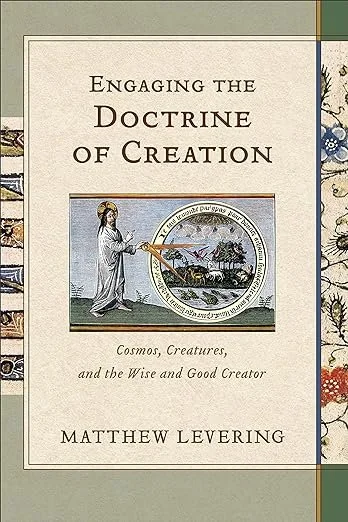The views expressed in this article are of the author only and do not necessarily represent those of the Center for Pastor Theologians.
Engaging the Doctrine of Creation: Cosmos, Creatures, and the Wise and Good Creator
Matthew Levering
Baker Academic (2017). 384 pp.
This third volume in Levering’s “Engaging the Doctrine of . . .” series combines deep theological reflection—drawing particularly from the wells of the church fathers and Thomas Aquinas—thoughtful theological exegesis of Scripture, and wise engagement with diverse contemporary interlocutors, both within and without the church. It is not a comprehensive account of creation; as Levering notes, there is no consideration of providence, nor of angels, nor of new creation; nor is there a distinct treatment of creatio ex nihilo. Intentionally, Levering does not engage in detail with questions of science and faith. Instead, he meets the prior need for a deep engagement with the Christian doctrine of creation itself.
The book follows John Webster’s account of the material order of the doctrine—first the God who has life in himself (chapters 1–2); then the creatures who have life in him (chapters 3–5), and then the temporal unfolding of covenant fellowship between God and creatures (chapters 6–7).
By giving attention to the divine ideas and divine simplicity, the first two chapters establish that God is not merely one (albeit extremely great) being among other beings. Rather, he is the uncreated Creator who has life in and from himself. There is, therefore, an infinite ontological gulf between him and his creation. This does not mean that God is distant from creation. As the wholly free and personal Creator, on whom creation depends at every moment for its existence, God is “more interior to creation than creation is to itself ” (p. 57), and created being is utterly gratuitous—the free gift of divine generosity.
These chapters are not for the faint-hearted! Those who lack a reasonably solid understanding of Aquinas’s doctrine of God will probably make heavy weather of them. But for those with the necessary equipment they more than repay careful reading. The remaining chapters are more readily accessible for most pastors.
Chapter 3 asks why there is such apparently wasteful diversity in creation (including billions of creatures that are now dead and species that are extinct). Levering follows Basil the Great’s Hexaemeron, arguing that Genesis 1 does not offer a scientific account of origins, and therefore does not address the scientific questions of Basil’s day or ours. Instead, Basil’s literal reading of Genesis 1 argues that everything in creation reveals God’s glory. Science then helps Basil (and us) to marvel at the rich diversity of creatures and what they reveal of the infinitely wise and good Creator.
In chapter 4, Levering examines modern interpretations of the image of God as a democratised royal image alongside patristic-medieval exegesis that places it in human capacities to image God’s reason, goodness, and freedom. He argues that “to share God’s rule means to exercise wisdom and generous love [in relation to God, one another, and the whole creation] which is none other than to exercise the powers of the soul” (p. 190).
Chapter 5 examines God’s commandment to “be fruitful and multiply,” and asks whether it is wise, given the effects of human evil, not least the devastating environmental impacts of explosive population growth. The chapter is a complex and nuanced discussion of the biblical and theological materials, and the ecological reasons that might lead some to abstain from procreation.
As he moves from dogmatic and exegetical reasoning to prudential reasoning, Levering’s handling of the arguments is perhaps less secure: this is, in my judgement, the weakest section of the book. I wonder if his discussion of the prudential cases for and against procreation is detailed and specific enough. Given that he can conceive of a time when abstaining from procreation might be wise, I am uncertain on what grounds he thinks now is not yet the time, and how we might know if and when that time has come. Similarly, it was unclear, at least to this reader, how Levering’s openness to prudentially non-procreative marriage squares with his apparently absolute rejection of contraception for fear of marriages selfishly turning inwards to lesser goods.
The final two chapters consider creation in relation to the economy of salvation. Chapter 6—rightly in my view—argues that an historical fall, involving real people at a real place and time, is theologically necessary. Also necessary is a doctrine of original sin that acknowledges the unity of all humans in Adam and Eve, human death as a punishment for original sin, and a tight relationship between original sin, the original goodness of creation before sin entered the world, and, consequently, confidence in the wise goodness of the Creator.
The final chapter beautifully portrays the relationship of creation and atonement. Creation is a personal and relational order of justice, which through sin is out of joint with the Creator’s intention. But, in God’s love and wisdom, Jesus the incarnate Son suffered and made satisfaction for our sin within that order of justice and thus vindicated God’s creation plan and achieved the human eschatological vocation of offering creation in its wholeness back to God in praise and thanksgiving.
Overall, Levering gives us truly theological theology. He is deeply attentive to Scripture and the Christian tradition, conversant with an array of contemporary voices, aware of the systematic connections between different doctrines, and alive to their ethical implications. He is also delightfully doxological, engaging the doctrine of creation in ways that lead to awed delight and joyful praise of the wise and good Creator.
Matthew Mason (PhD, University of Aberdeen) is the Assistant Director at the Pastors Academy at the London School of Theology.




